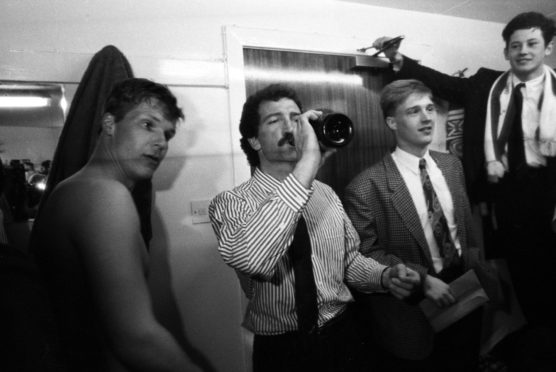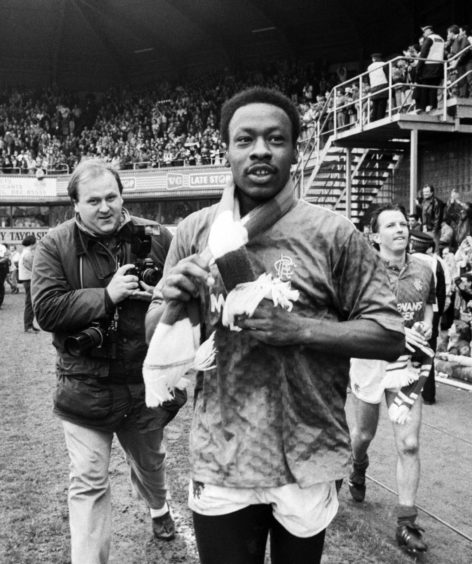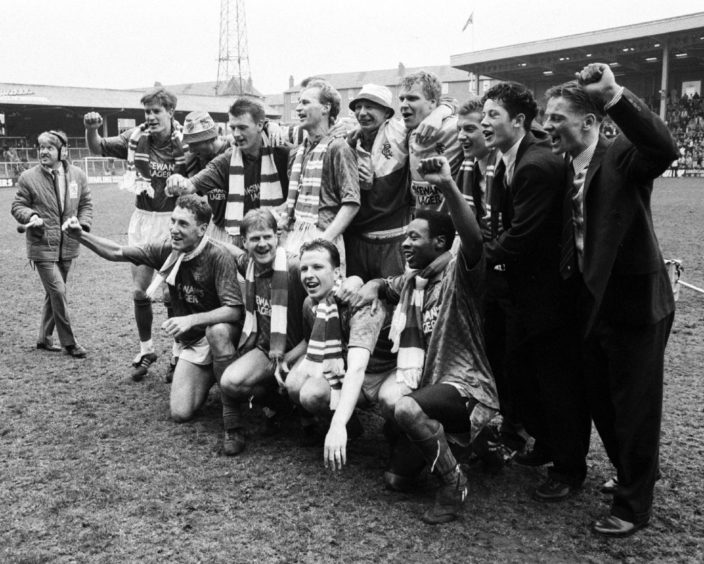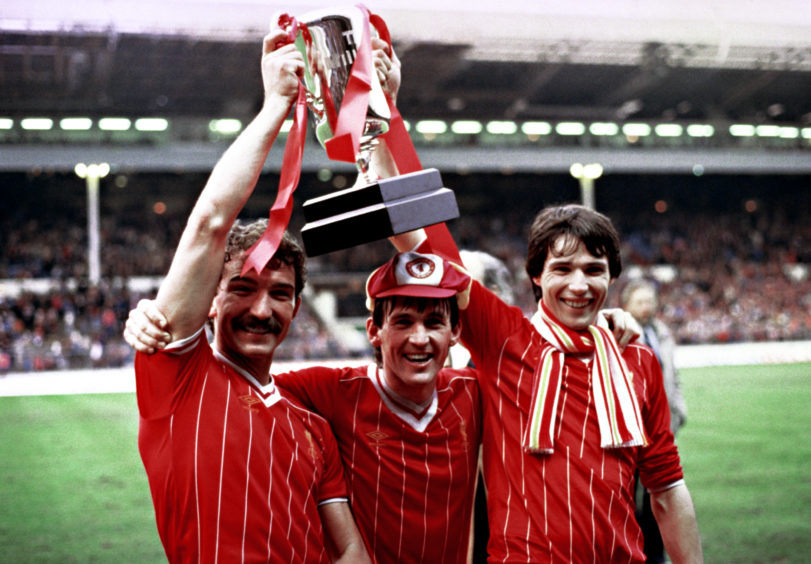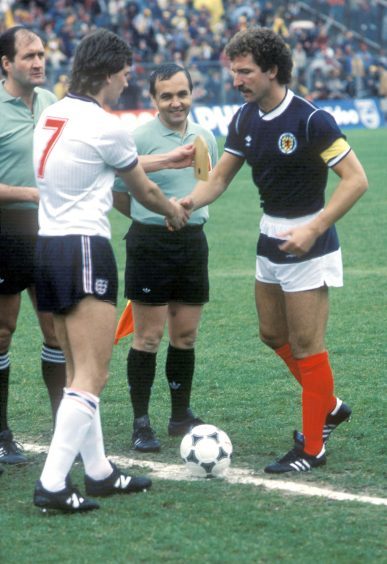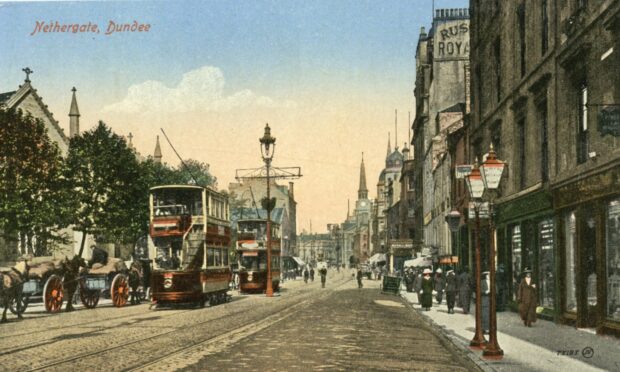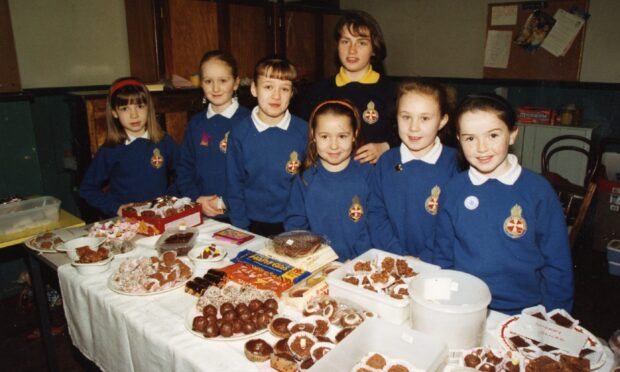Football legend Graeme Souness will return to the city where he enjoyed one of his greatest triumphs to talk about his career.
The Liverpool, Rangers and Scotland hero will appear at Dundee’s Whitehall Theatre on October 10 alongside former Ibrox winger Mark Walters.
They have also promised to make it an extra special night for 200 NHS and care home workers who will be getting free tickets.
Souness retains fond memories of Dundee after a Trevor Steven header sealed back-to-back titles for Rangers with a 1-0 victory over Dundee United at Tannadice 30 years ago on April 21.
Born in Edinburgh in 1953, Souness started his career as an apprentice at Tottenham Hotspur under the legendary Bill Nicholson.
The only game Souness played for Tottenham’s first team was a European match against Icelandic club, Keflavík.
Souness played 10 games in the North American Soccer League on loan for Montreal Olympique before Tottenham sold him to Middlesbrough in 1973 for £30,000.
He spent six seasons at Middlesbrough and won a promotion to the First Division in 1973-74.
He signed for Liverpool in 1978.
The sum Liverpool paid for him was £352,000 which was at that time a transfer record between English clubs and he enjoyed seven seasons of incredible success at Anfield, including three European Cups, five First Division championships and four League Cups.
He said: “The nearest I had been to European competition before was watching the Eurovision Song Contest so it was a dream come true when I won a European Champions’ medal within four months.”
Bruce Grobbelaar, Sammy Lee and Ronnie Whelan all said Souness was the best player they played with at Liverpool.
Skippering the team for much of his time at Anfield, he made 359 appearances and scored 55 goals before leaving for Sampdoria in Italy in 1984.
He won the Coppa Italia there, for the first time in the club’s history.
Souness scored in the final.
He returned to Britain in 1986 as player-manager of Rangers after the 1986 World Cup in Mexico, ushering in ‘The Souness Revolution’.
He used the lever of guaranteed European football to sign players of genuine quality.
England regulars Terry Butcher, Chris Woods, Trevor Francis, Ray Wilkins, Gary Stevens and Trevor Steven didn’t require a second asking.
It was the same with Scottish internationalists Richard Gough and Mo Johnston.
They all proved to be marquee signings.
Souness won three Scottish Premier Division titles before he left Rangers to replace Kenny Dalglish at Liverpool in 1991 after setting the foundations for the nine-in-a-row era that was continued by his trusty right-hand man Walter Smith.
Souness led his team to the 1992 FA Cup Final, beating Sunderland at Wembley.
During his time in charge at Anfield, Souness also developed the likes of Robbie Fowler and Jamie Redknapp before he parted company with Liverpool in January 1994.
He went on to manage Galatasaray, Southampton, Torino, Benfica, Blackburn Rovers and Newcastle United.
Souness also won the League Cup in Cardiff with Blackburn in 2002, with Andy Cole scoring the winning goal.
Souness was awarded 54 caps for Scotland and played at the 1978, 1982 and 1986 World Cup finals.
The Longest Forty Production Company, which has organised the Whitehall Theatre event, will be giving away over £3,000-worth of tickets free to NHS and care home workers.
John Brown, from Broughty Ferry, who runs the events firm, returned to the frontline himself after answering an urgent appeal to come back and help the NHS during the pandemic.
“Graeme and Mark thought it was a fantastic idea, and they’ve promised to make the night extra special.”
Mr Brown said: “Whilst I’m humbled to be able to return to the NHS and help during the pandemic, it’ll be nice also to get back to the ‘day job’.
“I’ve been overwhelmed witnessing NHS staff at all levels go over and above day after day, and thought this would be an ideal way to give something back.
“The Longest Forty would like to say thank you to those who have kept our country running during this unprecedented crisis.
“Graeme and Mark thought it was a fantastic idea, and they’ve promised to make the night extra special.
“I must also mention two local companies; TEC Supplies Ltd and Dundee Glass and Glazing who are sponsoring this event, thus helping make this gesture possible.
“Now working for Sky Sports, Graeme is arguably the most respected football pundit in the country.
“Mark Walters joined Graeme at Ibrox from Aston Villa and became a firm fans favourite with some electric displays, winning three league championship medals in the process.
“His incredible story of his time in Scottish football, before following Graeme to Liverpool, includes making his debut in an Old Firm derby and rising above the most extreme racism anyone in the modern Scottish game has experienced.”
Tickets for NHS workers and care home workers will be available from Friday at 8am via thelongestforty.com
Career in numbers
Graeme Souness
Born
May 6 1953
Career
1969–1973 – Tottenham Hotspur.
1972 – Montreal Olympique (loan)
1973–1978 Middlesbrough
1977 – West Adelaide (loan)
1978–1984 – Liverpool
1984–1986 – Sampdoria
1986–1991 – Rangers
Playing honours
Middlesbrough
Second Division – 1973–74
Liverpool
First Division – 1978–79, 1979–80, 1981–82, 1982–83, 1983–84
League Cup – 1980-81, 1981–82, 1982–83, 1983–84
FA Charity Shield – 1979, 1980, 1982
European Cup: 1977–78, 1980–81, 1983–84
Sampdoria
Coppa Italia – 1984–85
Rangers
Scottish Premier Division: 1986–87
Scottish League Cup: 1986–87
Managerial honours
Rangers
Scottish Premier Division: 1986–87, 1988–89, 1989–90
Scottish League Cup: 1986–87, 1987–88, 1988–89, 1990–91
Liverpool
FA Cup: 1991–92
Galatasaray
Turkish Cup: 1995–96
Turkish Super Cup: 1996
Blackburn Rovers
League Cup: 2001–02
Scotland
54 caps (4 goals)
First cap – versus East Germany 3-0, October 30 1974
Last cap – versus West Germany 1-2, June 8 1986
Did you know?
In 1982, Souness and Liverpool team-mate Sammy Lee made cameo appearances, as themselves, in an episode of the BBC’s Liverpudlian drama series Boys From The Blackstuff.
Written by Alan Bleasdale, the series offered a critique of Thatcherism – and in particular the large-scale unemployment then evident in urban Britain.
